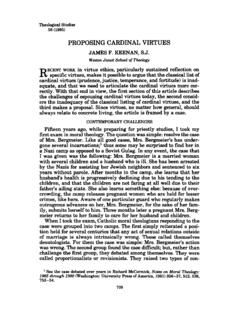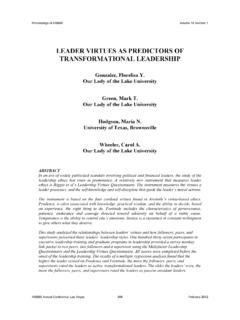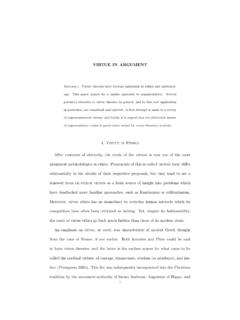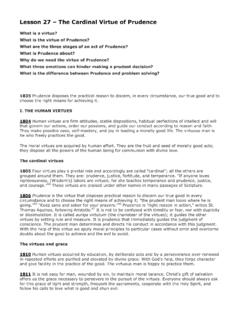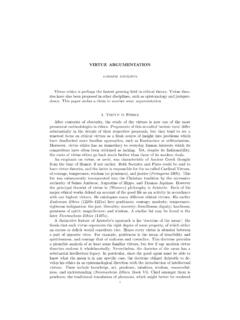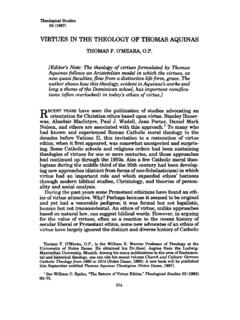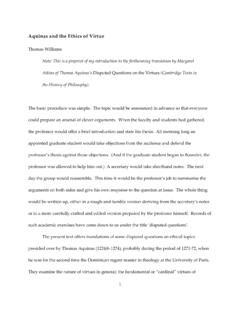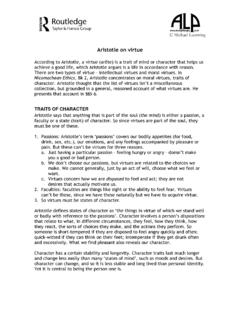Transcription of Greek conceptions of virtue - WIT Repository
1 1 Greek conceptions OF virtue Sean Moran Waterford Institute of Technology Introduction I shall start this discussion of the ancient Greek conception of virtue by considering some of our present-day notions of virtue and virtuous living. What comes to mind here in 21st century Ireland when we hear the word virtue ? We might suggest that in the present economic climate, the virtues of thrift and prudence are making a return to public discourse. There is a hopeful feeling that the downturn will make us more community-minded and willing once again to show the virtue of charity to our neighbours.
2 The public mood is one of shunning the vice of conspicuous consumption and becoming more temperate in our spending. But what virtues are really motivating the pronouncements of those in public life? Personal glory? Cunning? Wealth? When we hear this list of supposed virtues , we experience intellectual vertigo, for they sound more like vices than virtues . But to the Greek poet Homer1, these are all heroic virtues , and it is these with which I begin a brief exploration of ancient Greek conceptions of virtue . Homeric virtues For Homer, a virtue2 is an attribute which enables a free man to fulfill his role in life and death.
3 Physical strength, deviousness and boldness enabled the Homeric hero to excel at challenges such as those of the battlefield, and thus achieve fame, honour and glory (k dos in the Greek ). One example of this is in Homer's Odyssey, when Odysseus returns home to Ithaca, after his long adventurous voyage, to confront the suitors of his wife Penelope. (His epic travels had involved him masterminding the Trojan horse trick, blinding the giant Cyclops and listening to the song of the sirens without perishing on the rocks).
4 While he had been away, local noblemen had taken over his house, eating his food and drink, making free with the servant girls and, worst of all, trying to seduce his wife Penelope. To the hero, Odysseus, this is of course intolerable. His reputation demands that he wreaks vengeance on the suitors. There is no turning of the other cheek here, for self-restraint is not a Homeric virtue . So how does Odysseus exact revenge? There are over a hundred noblemen, together with their servants, eating him out of house and home: a force to be reckoned with for just one man.
5 As we might expect, Odysseus deploys the Homeric virtue of cunning. He dresses in filthy rags grimy with smoke 3 and approaches his estate with the appearance of an old beggar. Once inside, he gathers intelligence 1 ca. 750 700 BCE 2 The Latin word Virtus also points to this notion of virtue as manliness (L. Vir = Man , as in Virile ). The virtuous man was a brave warrior. 3 Homer, Odyssey, Book 13, 435 2 about the suitors, teams up with his son Telemachus and slaughters every one of the intruders using his bow and arrow, sword and spear.
6 He then slowly hangs the women who had slept with the enemy and tortures the goatherd Melanthius to death for insulting him: .. with a pitiless knife they sliced his nose and ears off; they ripped away his genitals as raw meat for the dogs, and in their fury they lopped off his hands and feet. 4 This is the Homeric code of honour 5 in which disrespect must be avenged in the interests of personal aggrandisement. Today we might feel that, yes, the suitors certainly did do something wrong, but that the punishment meted out was somewhat disproportionate to their crimes.
7 From the perspective of ancient Greek heroic society, however, the insult against Odysseus, and the abuse of hospitality fully deserved the rather harsh response. In these brutal contexts, the Homeric virtues of cunning, strength and the seeking of personal glory start to look a little more like virtues and less like vices. Indeed, to Homer the Christian virtues of meekness and modesty would be vices, in that they show weakness and interfere with the hero maintaining his personal status. The Greek for virtue , aret , is also frequently translated as excellence and this notion applies to objects as well as persons.
8 So we might speak of an excellent sword a sword which has the virtue of sharpness (and is thereby useful for beheading unwanted guests, a punishment Odysseus inflicts on the innocent priest Leodes 6). The virtue of an object thus relates to that object's function or ergon. A sword has the function of cutting, so sharpness is a virtue or aret of a sword. If a man s function is seen as heroic, then the Homeric virtues will be such as to enable a man to undertake heroic acts and thus achieve an heroic reputation.
9 Classical Period Greek virtues Later Greek thinkers proposed a less bloodthirsty and narcissistic ergon for man. Beheading and posturing had no part in this conception ; in fact self-regarding action was replaced by abstract contemplation as the highest ergon of humanity. Instead of the action hero, we have the strange and rather comical figure of Socrates, drunkenly wandering barefoot in the marketplace (the agora) and telling anyone who would listen that neither he nor they actually knew anything. He died in disgrace, though.
10 Socrates was found guilty on trumped-up charges (of impiety and corrupting the youth of Athens) and was executed by drinking hemlock. To Socrates, Plato and aristotle , the ergon of man was to flourish, and this flourishing (eudaimonia) was at its highest when man, a rational animal , engaged in rational In the democratic city-state of Athens, co-operation, rationality and dialogue were favoured over the hot-headed individuality of Homer's times. So the virtues defined in this era are more recognisable to us as virtues than those of Homer.

